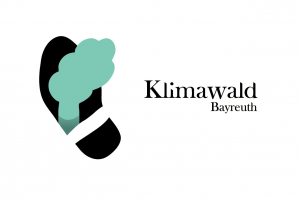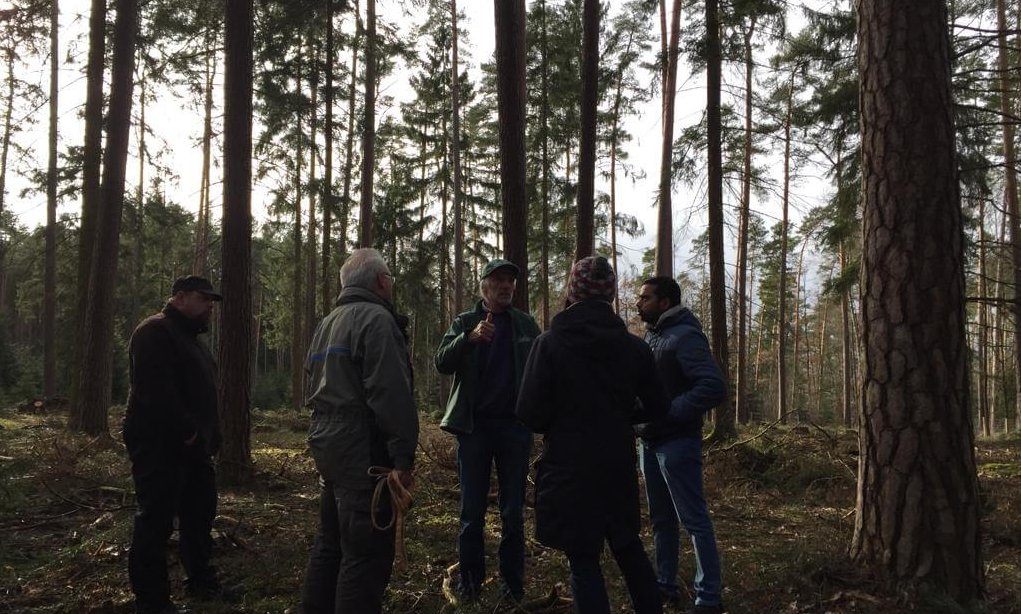By: Theresa Landwehr , Kun Ro, and Nikunj Pathak 
Tree plantation: 25-27 April 2019
Back to the 17th century, when the mining industry in Saxony was threatened by the scarcity of forests, Hans Carl von Carlowitz formulated principles for sustainable forestry. In his work Sylvicultura Oeconomica oder naturmäßige Anweisung zur wilden Baum-Zucht (Sylvicultura Oeconomica or the Instructions for Wild Tree Cultivation) he coined the term ‘sustainability’ or “Nachhaltigkeit” (in German) and emphasized on the need of planned reforestation projects. Today our world is facing a serious threat from climate change. In the year 2018, we experienced the warmest summer in Germany in recent times. According to the National Meteorological Service (Deutscher Wetter Dienst, DWD), the temperature in June 2018 was 2.4°C higher than the average temperature between 1961-1990. There is enough evidence to say that the increase in global temperatures is caused by anthropogenic Green House Gas emissions (GHGs).
After energy and industry, the transport sector is the third largest contributor to GHG emissions in Germany and Europe. The overall emissions from the transport sector in Europe have increased by 3%, the emissions from international aviation have increased by 1.5 % in 2017 (EEA). In our study program, Global Change Ecology (GCE) students come from many countries. The present cohort of GCE students represents four major continents namely Asia, Africa, Europe, and America. Due to the diversity of study program, and its unique course structure, we (students) travel for conferences, internships, science schools, master thesis, and visit our family in home countries. Through these activities, we end up releasing tons of carbon dioxide in the atmosphere. To check this, we decided to do a carbon footprint calculation for our friend Kun. In the year 2017-18, he traveled between South Korea, Germany, and Finland and this travel itinerary produced 3.07-ton CO2 equivalents in the atmosphere. Like Kun, many of us travel in Germany, Europe or abroad for work and studies. This means we are emitting more GHGs in the atmosphere.

So, “What shall we do now? How can we offset our carbon emissions?”, we asked ourselves. After looking for all possible mitigation options we thought why not do something here in Bayreuth, why not plant some trees for offsetting our emissions. Well, we know that on an average, a tree can absorb 48 pounds of carbon dioxide per year and sequester about 1 ton of carbon dioxide by the time it ages 40 (Tree fact NC State University). Furthermore, forest ecosystems provide valuable ecosystem services, as they prevent erosion, absorb solar radiations and reduce global warming. In addition, they provide habitat for birds, insects, animals, and humans. But the question was how, when and where to plant trees. We pitched our idea to Dr. Birgit Thies (BayCEER) and Dr. Gregor Aas (Ökologische Botanischer Garten, ÖBG). They were overwhelmingly positive about our idea. Together we prepared a proposal and decided to approach the “Amt für Ernährung, Landwirtschaft und Forsten” (AELF) and the “Stadtförsterei Bayreuth”. The officials from AELF and Stadtförsterei liked our proposal and provided 1-hectar (ha) land for the project. In the past, this forest land has suffered from drought, heat, and bark beetles. Therefore, we decided to reforest this land. And thereby the Klimawald Bayreuth was born.

We are aware of the ongoing climate change, and the rising mean annual temperatures which are putting our forest ecosystems under stress. Our project Klimawald Bayreuth will build a climate resilient forest – a forest for future climate. This forest will be capable of tolerating at least 2°C warming condition. For this reason, we decided to plant a mixture of native and non-native trees. Around 4700 trees belonging to 10 different species will be planted in the first leg of the project, from April 25-27, 2019. The second plantation drive will be organized in spring next year. Based on soil, light and climatic conditions long-term forest management plan for maintenance of the site is being prepared. Moreover, the project site is fenced for preventing any interference from surrounding wildlife. Through this project, we want to mitigate climate change, reduce our emissions and bring a positive change in society.
At present, our target is to mobilize approx. 180 participants working in 9 groups – 3 groups per day with each having 20 participants. The planting will take place from 25 – 27 April 2019. In the interest of sustainability, and for a happy and green future, we invite university students, researchers, lecturers, high school students, and citizens to join our efforts.
Together we will create a forest of the future!
Where birds will sing,
Bees will fly,
Soil will be steady,
And trees grow high…
To join our efforts in planting trees, please register at https://www.bayceer.uni-bayreuth.de/klimawald/?lang=en
For more information visit our website: https://www.klimawaldbayreuth.com/

The project is supervised by Dr. Birgit Thies (BayCEER) and Dr. Gregor Aas (ÖBG) with support from AELF and Stadtforestei Bayreuth. We are thankful to our partners Friends of GCE e.V., Summer in the City e.V., KHG Bayreuth, Forum 1.5 and BcG Alumni e.V.
References
Pan, Y., Birdsey, R. A., Fang, J., Houghton, R., Kauppi, P. E., Kurz, W. A., … & Ciais, P. (2011). A large and persistent carbon sink in the world’s forests. Science, 333(6045), 988-993.
http://shrinkthatfootprint.com/
https://knoema.com/atlas/Germany/CO2-emissions-per-capita
Title Photo by Sebastian Unrau on Unsplash









